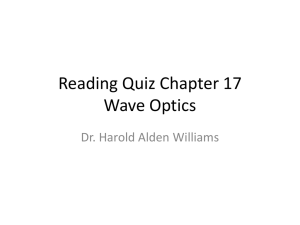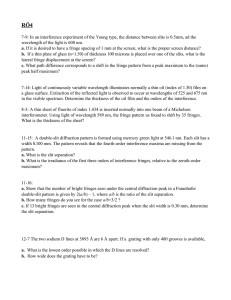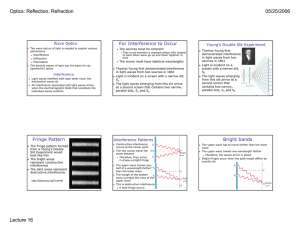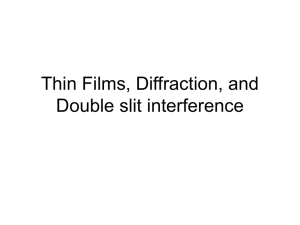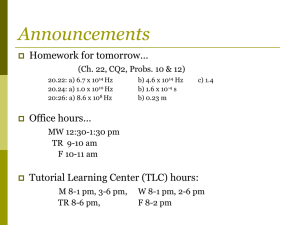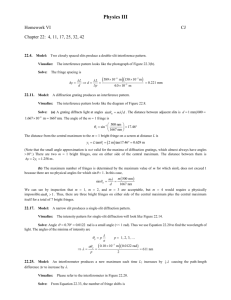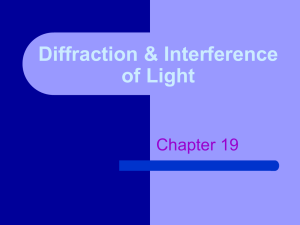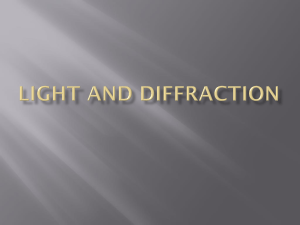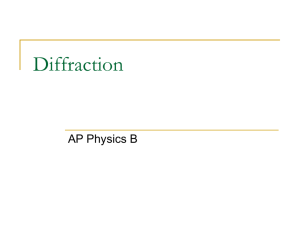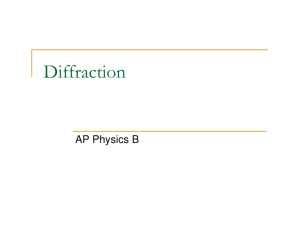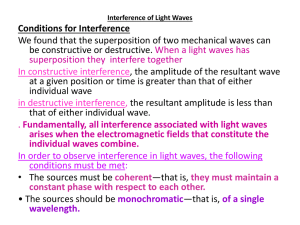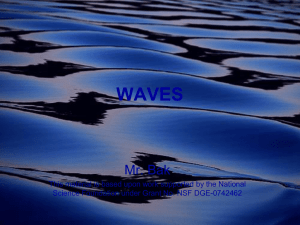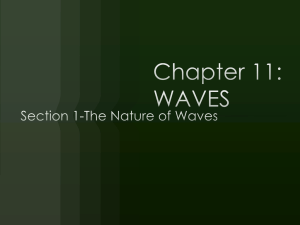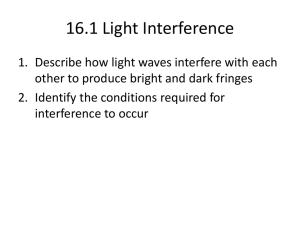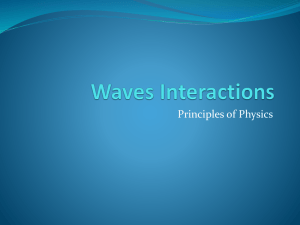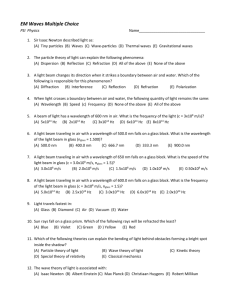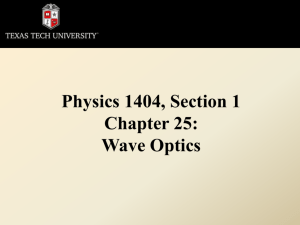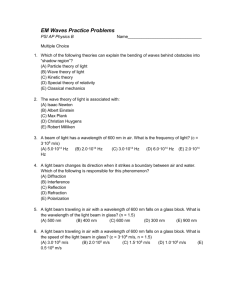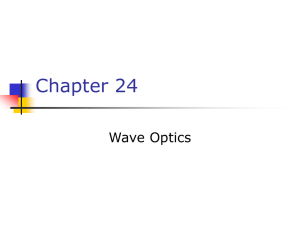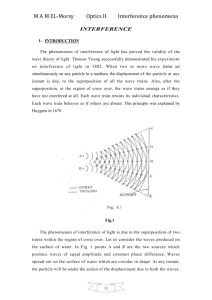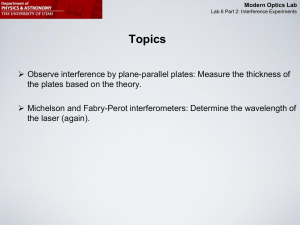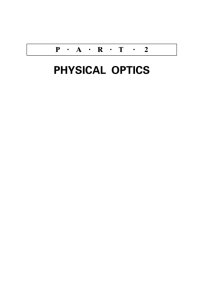chapter22.1 - Colorado Mesa University
advertisement
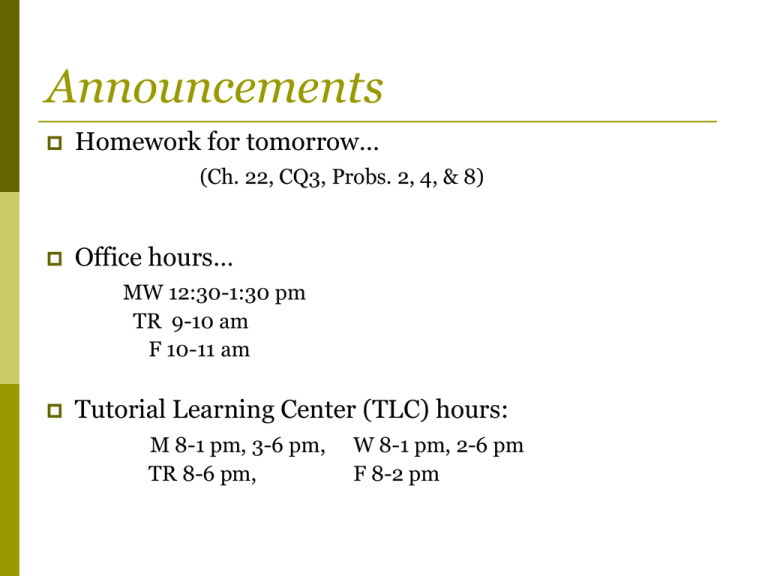
Announcements Homework for tomorrow… (Ch. 22, CQ3, Probs. 2, 4, & 8) Office hours… MW 12:30-1:30 pm TR 9-10 am F 10-11 am Tutorial Learning Center (TLC) hours: M 8-1 pm, 3-6 pm, TR 8-6 pm, W 8-1 pm, 2-6 pm F 8-2 pm Chapter 22 Wave Optics (Light and Optics & The Interference of Light) Last time… Frequency, f, and period, T… The wave speed is… The index of refraction is… The wavelength in a material is… i.e. 20.8 Light traveling through glass Orange light with a wavelength of 600 nm is incident upon a 1.00 mm thick glass microscope slide. a. What is the light speed in the glass? b. How many wavelengths of the light are inside the slide? Diffraction of a H2O Waves… A H2O wave, after passing through an opening, spreads out to fill the space behind the opening. Diffraction = spreading out of waves. All waves experience diffraction. Interference… Diffraction of Sunlight? Unlike a H2O wave, when light passes through a a large opening, it makes a sharpedged shadow. This lack of noticeable diffraction means that IF light is a wave, the wavelength must be very small. So, is light a wave or a particle? 22.1: Light and Optics Does light consist of waves or of particles? Isaac Newton (1660) does not witness diffraction of sunlight. concludes that light must consist of very small, light, fast particles that he calls corpuscles. Thomas Young (1801) produces interference between two waves of light. concludes that light consists of waves (but WHAT is waving?). James Maxwell (1860) Maxwell equations predict EM waves that travel at a speed c! Albert Einstein (1905) Photoelectric effect Light consists of photons w/ BOTH wave-like & particle-like properties! Models of Light… Wave Model: Under many circumstances, light exhibits the same behavior as sound or water waves. The study of light as a wave is called wave optics. Ray Model: The properties of prisms, mirrors, and lenses are best understood in terms of light rays. The ray model is the basis of ray optics. Photon Model: In the quantum world, light behaves like NEITHER a wave NOR a particle. Instead, light consists of photons that have both wave-like and particle-like properties! 22.2: The Interference of Light When light passes through a very small opening, it spreads out. Diffraction of light is observable IF the hole is sufficiently small. Young’s Double-Slit Experiment… Young’s Double-Slit Experiment… Analyzing Double-Slit Interference… What are the angular positions of the bright fringes in the interference pattern? Where does the mth bright fringe occur? Analyzing Double-Slit Interference… What are the angular positions of the bright fringes in the interference pattern? in radians! Where does the mth bright fringe occur? Analyzing Double-Slit Interference… What is the fringe spacing between the m fringe and the m+1 fringe? Analyzing Double-Slit Interference… What is the fringe spacing between the m fringe and the m+1 fringe? Notice: The interference pattern is a series of equally spaced bright lines. Analyzing Double-Slit Interference… Where does the mth dark fringe occur? Analyzing Double-Slit Interference… Where does the mth dark fringe occur? Notice: The dark fringes are located exactly halfway between the bright fringes. i.e. 22.1 Double-slit interference of a laser beam Light from a helium-neon laser (λ =633 nm) illuminates two slits spaced 0.40 mm apart. A viewing screen is 2.0 m behind the slits. What are the distances between the two m=2 bright fringes and between the m=2 dark fringes?
